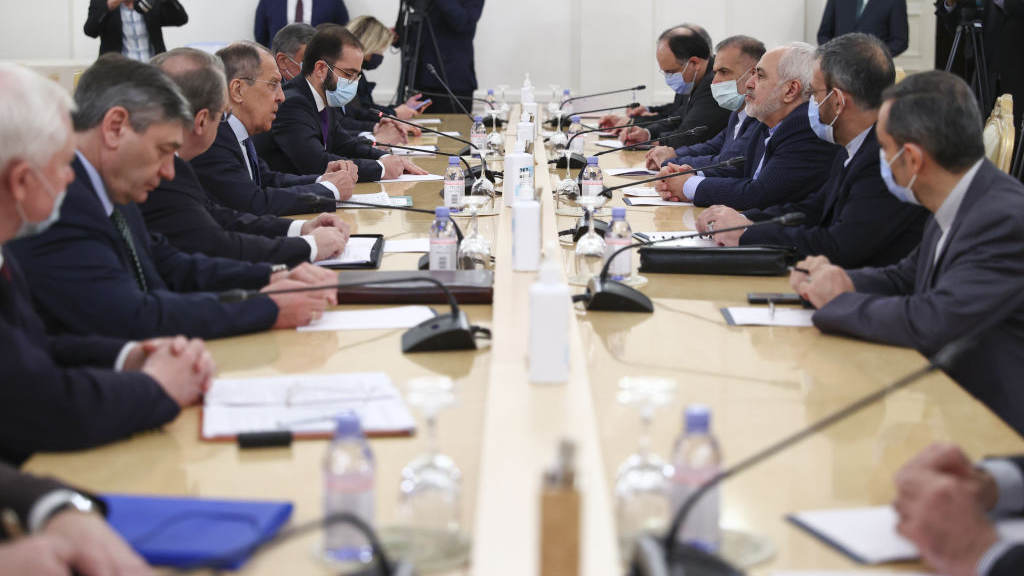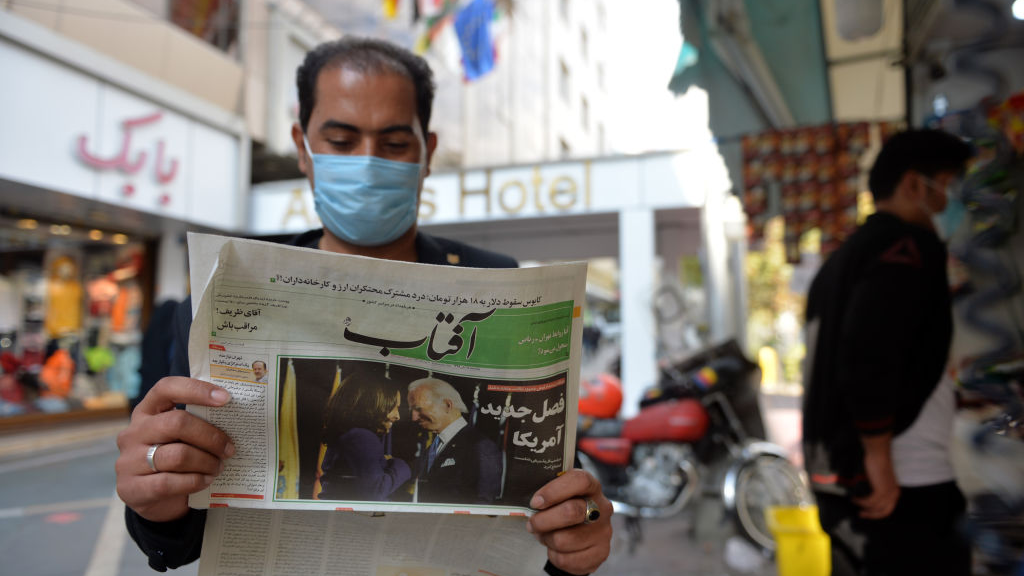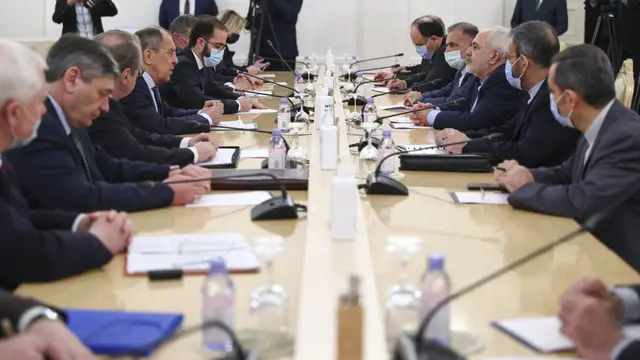
Russian Foreign Minister Sergey Lavrov (center L) meets Iranian Foreign Minister Javad Zarif (center R) in Moscow, Russia, January 26, 2021. /Getty
Editor's note: Lan Shunzheng is a research fellow at Charhar Institute and a member of the Chinese Institute of Command and Control. The article reflects the author's opinions, and not necessarily the views of CGTN.
According to Arab News, the foreign ministers of Russia and Iran held their first meeting on January 26 since U.S. President Joe Biden took office, during which the two jointly called for the rescue of the Iran nuclear agreement. Obviously, with Biden's appointment and the joint voice of Russia and Iran, the Iran nuclear agreement may rekindle hope.
In July 2015, Iran reached a comprehensive agreement on the Iranian nuclear issue with the United States, Britain, France, Russia, China, and Germany. According to the agreement, Iran promised to limit its nuclear program, and the international community lifted sanctions against Iran.
Undoubtedly, the conclusion of the Iranian nuclear agreement is an important result of multilateral actions, a model of peaceful resolution of international hot spot issues through political and diplomatic means, and fully demonstrates the importance of coordination and cooperation between the major powers.
However, in May 2018, the Trump administration unilaterally withdrew from the Iran nuclear agreement and subsequently restarted and added a series of sanctions against Iran, while Iran has gradually suspended the implementation of some of the terms of the agreement since May 2019.
The setback of the Iranian nuclear agreement has had a very negative impact on the maintenance of the international nuclear non-proliferation system and peace and stability in the Middle East. After the United States restarted sanctions, U.S.-Iran relations deteriorated rapidly and once again fell into a vicious circle of tense confrontation, which increased the risk of regional war.
For example, in early 2021, Iran held four military exercises, seized a South Korean oil tanker, and announced that it would increase the enriched uranium abundance to 20 percent in order to demonstrate to the United States. At the same time, the sanctions have dealt a major blow to the Iranian economy, leading to increasing problems such as Iran's foreign exchange shortage, currency depreciation, and increased inflation.
Especially as the focus of the blow, Iran's current oil exports have dropped by 92 percent compared to its peak. According to the assessment of the Iranian Parliamentary Research Center, U.S. sanctions have caused Iran's GDP to fall by 0.8 percent in the 2018-2019 fiscal year and 2.5 percent in the 2019-2020 fiscal year. In September 2020, Iranian President Hassan Rouhani stated that since the U.S. withdrew from the nuclear agreement and reinstated sanctions in 2018, U.S. sanctions have caused Iranian losses of $150 billion.
In addition, due to the deterioration of the economic situation and the increase in the unemployment rate, there have been waves of protests among the Iranian people in recent years, which has led to turbulence in Iran's internal political situation.
However, the change of the U.S. presidency gives hope again. Unlike Trump, President Biden is the main supporter of the arms control treaty. As a senator during the Cold War, Biden went to the Soviet Union to negotiate on the U.S.-Soviet Intermediate Range Treaty. When Trump withdrew from the Treaty, Biden expressed strong opposition. During the campaign, Biden vowed to overthrow some of the foreign policies formulated during Trump's tenure and once said that he had made many diplomatic efforts when he was vice president and achieved a series of results, including the signing of the New Strategic Arms Reduction Treaty. He also accused Trump of "wasting these legacies."
After taking office, Biden immediately began to liquidate Trump's "political legacy" and signed 33 administrative orders within six days, covering various fields such as the fight against the epidemic, the economy, and immigration.

People learn about the U.S. elections in newspapers, in Tehran, Iran, November 9, 2020. /Getty
What is particularly striking is the first telephone conversation between Russian President Vladimir Putin and his U.S. counterpart Biden on January 26 to discuss the development of bilateral relations and global hot issues. According to a statement issued by the White House on the same day, the two discussed their willingness to extend the New Strategic Arms Reduction Treaty for five years and agreed that the teams of both parties should complete the extension of the treaty. They also agreed to launch strategic and stable discussions on a series of arms control and emerging security issues.
Undoubtedly, as the "ballast stone" of world strategic stability, the renewal of the New Strategic Arms Reduction Treaty has given the world a sigh of relief and convinced the world that Biden would be different from Trump. Since the Iran nuclear agreement is also one of Biden's advertised achievements, and Biden has previously hinted that he will restart dialogue with Iran and said that rejoining the Iran nuclear agreement is the first step to ease tensions.
This has made Iran expect a turning point. Iranian President Hassan Rouhani stated on December 17, 2020, that he "has no doubt" that the incoming Biden administration will push Washington to return to the Iran nuclear agreement. Two days after Biden took office, Iranian Foreign Minister Javad Zarif also published Iran's views on saving the nuclear agreement in the Foreign Affairs magazine, saying that the Biden administration can embrace the failed policies of the Trump administration or can choose a better path to end the failed policy of "maximum pressure" during the Trump era.
According to reports this time, Russian Foreign Minister Sergei Lavrov stated before the meeting that one of the most urgent issues is to save the Iran nuclear agreement. During the talks, Zarif thanked Moscow for its efforts to repair the Iran nuclear agreement after the United States withdrew and thanked Russia for its "constructive and principled" stance on the agreement.
It is not difficult to see that although there are still many contradictions between the United States and Iran, the same pace of Russia and Iran on the Iran nuclear agreement this time indicates that the two sides have been cautiously optimistic about the return of the U.S. to the Iran nuclear agreement.
This has also injected a "cardio-tonic agent" into the recovery of the Iran nuclear agreement.
(If you want to contribute and have specific expertise, please contact us at
.)
 简体中文
简体中文

